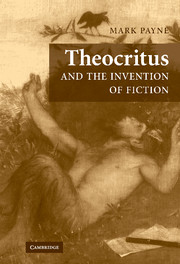3 - Becoming bucolic
Published online by Cambridge University Press: 22 September 2009
Summary
In the last chapter I argued that, in their concern to present characters who are real presences to the reader, Theocritus' bucolic poems are continuous with the performed drama of classical and Hellenistic theater. In particular, the poems that I examined make use of various kinds of framing device that cause the reader to experience the transition to the story world in a self-conscious way. Inducing an awareness of the poet's control of the boundary between story world and the reality of the reader thus becomes a crucial element in the poems' resistance to being taken simply as an intellectual object at the disposal of the reader. Like the opening address to the Muses in the Homeric poems, the framing of the story enables the audience's consensual transition from their own world to a world that is other than their own. Rather than limiting itself to a purely textual existence, the result of the belated position in a song culture that has become unexpectedly literate, Hellenistic literary drama insists upon its ability to confront the reader with the uncanny presence of a world that is other than his own. Indeed, the poems exploit a fact about fictional worlds that becomes all the clearer when these worlds originate on the page – literary beings can manifest themselves to us, but we cannot manifest ourselves to them.
- Type
- Chapter
- Information
- Theocritus and the Invention of Fiction , pp. 92 - 113Publisher: Cambridge University PressPrint publication year: 2007



